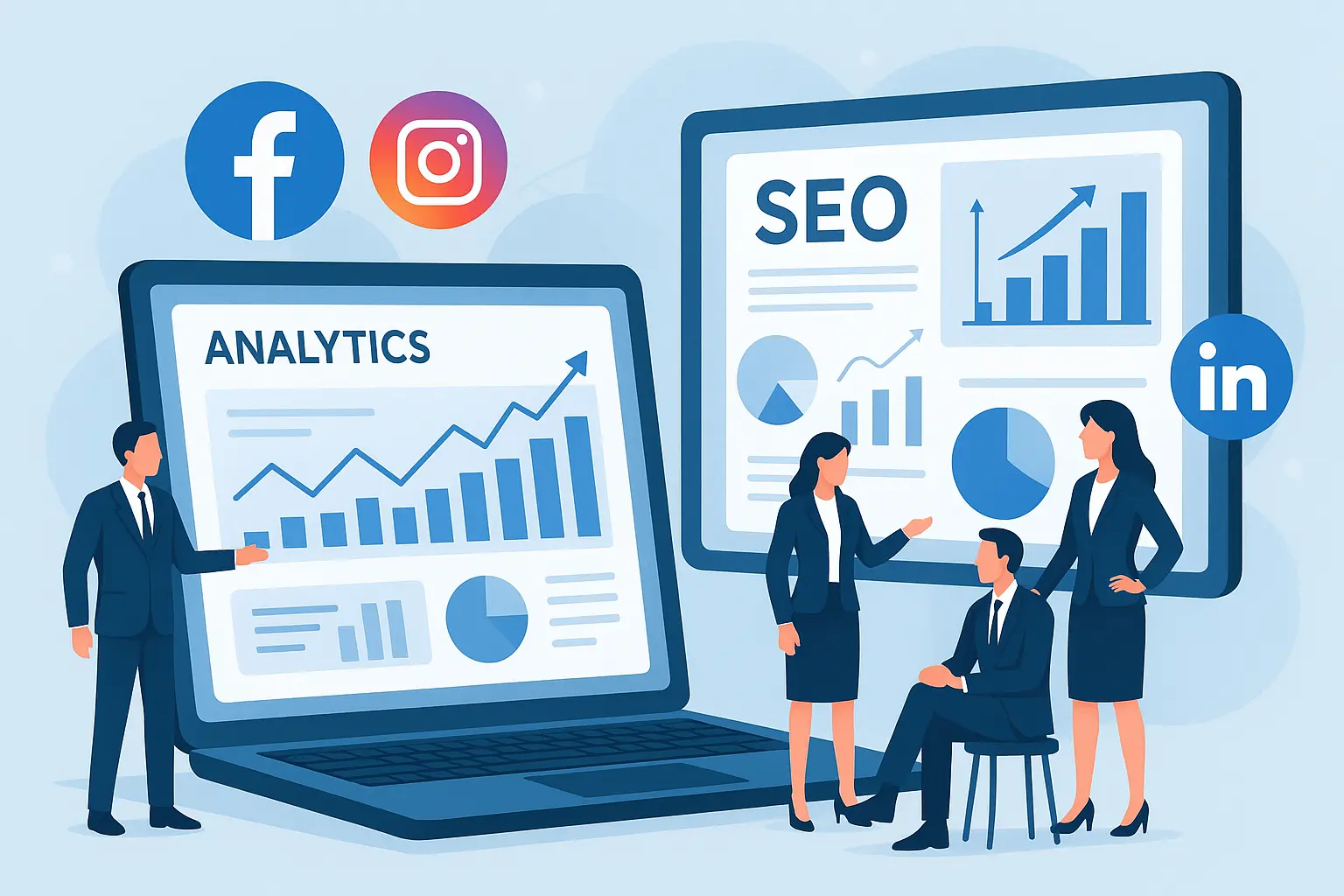In today’s hyper-connected world, digital marketing isn’t just a business option—it’s a survival strategy. With more than 5 billion internet users worldwide (Statista, 2024), digital channels have become the heartbeat of modern commerce. Businesses that fail to establish a strong online presence risk losing relevance, visibility, and revenue.
But why exactly is digital marketing important for business? Beyond just being a cost-effective marketing tool, digital marketing enables businesses to build trust, nurture long-term customer relationships, and leverage data-driven strategies that traditional marketing simply can’t provide.
Let’s dive deeper into the 17 compelling reasons why digital marketing is critical for every modern business.
Understanding Digital Marketing in Depth
What is Digital Marketing?
Digital marketing refers to all marketing efforts that use electronic devices and the internet to connect with audiences. It includes strategies like:
- Search Engine Optimization (SEO) – ranking organically in search engines.
- Pay-Per-Click Advertising (PPC) – buying targeted traffic instantly.
- Social Media Marketing (SMM) – engaging communities across platforms.
- Content Marketing – building authority through valuable resources.
- Email Marketing – nurturing leads with personalized communication.
- Affiliate & Influencer Marketing – leveraging partnerships for brand growth.
Unlike traditional marketing, digital marketing is two-way and data-centric—meaning businesses don’t just broadcast their message but also track, measure, and adapt strategies in real time.
From Billboards to Algorithms
Traditional marketing relied heavily on mass visibility with limited tracking. You could run a TV commercial but had no way of knowing how many people engaged.
Digital marketing, however, flips this model:
- Every click, share, or purchase is measurable.
- Campaigns can be personalized to the user level.
- Businesses can adjust campaigns in real time.
This flexibility is why over 72% of global marketing budgets in 2024 are being allocated to digital strategies.
The Role of Digital Marketing in Modern Business
1. Increasing Online Visibility
Your customers live online. Google processes over 8.5 billion searches daily, and 54% of social media users research products online before buying. Digital marketing ensures your brand shows up exactly when and where potential customers are looking.
2. Building Brand Authority and Awareness
Consistent visibility across digital touchpoints builds trust. Brands that rank on the first page of Google or share high-value content on LinkedIn and Instagram are instantly perceived as more credible.
3. Enhancing Customer Engagement
Digital marketing fosters two-way communication. Whether it’s replying to comments on Instagram, running polls on Twitter, or using chatbots on websites, businesses can create personalized and interactive customer experiences that traditional methods lack.
Business Growth Benefits of Digital Marketing
4. Cost-Effectiveness
Compared to a $20,000 TV commercial, a well-executed SEO campaign or PPC ad can generate measurable ROI for a fraction of the cost. Small businesses especially benefit because digital platforms don’t demand million-dollar budgets.
5. Data-Driven Decision Making
Platforms like Google Analytics, HubSpot, and Meta Ads provide real-time performance insights. This data helps businesses:
- Identify which campaigns drive conversions.
- Measure ROI down to the cent.
- Adjust strategies instantly instead of waiting months.
6. Precision Targeting and Personalization
Digital marketing allows you to target niche audiences by demographics, behavior, interests, and even device type. For example:
- A fitness brand can run Instagram ads targeting women aged 25–35 in urban areas interested in yoga.
- E-commerce stores can show retargeting ads to visitors who abandoned their cart.
This precision ensures your marketing dollars aren’t wasted.
7. Higher Conversion Rates
Since digital marketing often reaches an audience already interested in your products, conversion rates are significantly higher. Strategies like A/B testing landing pages or personalized CTAs boost conversion rates by up to 200%.
Proven Digital Marketing Strategies for Success
8. Search Engine Optimization (SEO)
SEO is the backbone of digital visibility. Ranking organically on Google means 24/7 traffic without paying for ads. High-ranking websites build trust and generate sustainable revenue streams.
9. Social Media Marketing (SMM)
With over 4.9 billion active social media users, platforms like TikTok, Instagram, LinkedIn, and Facebook have become virtual marketplaces. Businesses can:
- Build communities.
- Share engaging brand stories.
- Run targeted ad campaigns.
10. Content Marketing
Content is king, but context is queen. Blogs, videos, podcasts, and infographics provide value to customers while building authority and trust. For instance, companies that blog generate 67% more leads than those that don’t.
11. Email Marketing
Despite being one of the oldest digital strategies, email marketing remains one of the most effective with an average ROI of $42 for every $1 spent. Personalized campaigns keep customers engaged long-term.
12. Pay-Per-Click (PPC) Advertising
PPC delivers instant visibility on platforms like Google Ads and Facebook Ads. Unlike SEO, which takes time, PPC guarantees traffic, making it ideal for launches or time-sensitive offers.
Why Digital Marketing is a Lifeline for Small Businesses
13. Leveling the Playing Field
Digital marketing gives small businesses the tools to compete against giants. A local coffee shop can outrank Starbucks in local searches if its SEO is optimized.
14. Local SEO
Nearly 46% of all Google searches are local. With Google Business Profile, reviews, and local keywords, businesses can attract customers searching for “near me” queries.
The Future of Digital Marketing
15. Artificial Intelligence and Automation
AI-driven tools like ChatGPT, Jasper, and HubSpot’s AI assistants help automate content, run predictive analytics, and personalize campaigns. AI is set to handle 80% of routine marketing tasks by 2030.
16. Voice Search & Conversational AI
By 2025, 50% of all online searches are expected to be voice-based. Businesses that optimize for natural language and conversational keywords will dominate.
17. Hyper-Personalization & Immersive Tech
With AR/VR shopping experiences and hyper-personalized ads, digital marketing is shifting from mass communication to individualized experiences.
Challenges in Digital Marketing
Even though digital marketing is powerful, it comes with challenges:
- Constant algorithm updates (Google, Meta, TikTok).
- Ad fatigue from overexposure.
- Privacy concerns with data tracking.
Businesses must stay agile, learn continuously, and adapt to evolving customer behaviors.
FAQs on Why Digital Marketing is Important for Business
Q1. Why should businesses prioritize digital marketing over traditional methods?
Because digital marketing is measurable, cost-effective, and offers global reach—while traditional methods are limited in scope and tracking.
Q2. How does digital marketing improve customer trust?
Through consistent brand visibility, valuable content, and two-way engagement, businesses establish authority and credibility.
Q3. What industries benefit most from digital marketing?
Every industry—retail, healthcare, finance, education, and even non-profits—benefits from digital marketing strategies.
Q4. Can digital marketing guarantee sales?
No strategy guarantees sales, but data-driven targeting and optimized campaigns significantly improve conversion likelihood.
Q5. How much should a small business spend on digital marketing?
Experts recommend allocating 7–10% of revenue to marketing, with at least 50% of that dedicated to digital efforts.
Q6. What is the next big trend in digital marketing?
AI-driven personalization, voice search optimization, and immersive AR/VR brand experiences are the next frontiers.
Conclusion: Why Digital Marketing is Non-Negotiable for Businesses
The importance of digital marketing cannot be overstated. It is the lifeline that fuels visibility, engagement, trust, and growth in an era where customers are digitally native. From cost-effective campaigns to AI-powered personalization, digital marketing empowers businesses to compete, scale, and thrive.
Whether you’re a small local store or a multinational brand, the digital world offers endless opportunities. The question is no longer “Should I do digital marketing?”—but rather “How fast can I start before I get left behind?”


